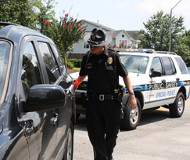12/24/2013
North Carolina Appeals Court Allows HOAs To Arrest For DUINorth Carolina Appeals Court allows armed HOA security guards to conduct traffic stops that would be illegal for police to make.

Rental cops hired by homeowners associations (HOA) can conduct traffic stops that would be unconstitutional if performed by an actual police officer, according to a ruling handed down last week by the North Carolina Court of Appeals. A three-judge panel took up the case of Frederick Lloyd Weaver Jr, who was stopped on April 20, 2012 by an armed security guard employed by Metro Special Police and Security Services. The HOA for the Carleton Place townhomes near the University of North Carolina at Wilmington contracted with Metro for security services.
North Carolina allows armed guards to wear police-like uniforms with badges, carry guns and drive cars with flashing red and white light bars. Qualifying for the security guard position requires four hours of classroom instruction and a day on the range.
Security guard Brett Hunter received no training as to estimating speed or handling drunk drivers, but he was tasked with issuing speeding tickets to people driving through the community. When Hunter saw Weaver's Acura through his rearview mirror, he guessed that the car was traveling at 25 MPH in a 15 MPH zone. He turned on his flashing lights and forced Weaver to pull over.
"I'm Officer Hunter from Metro Public Safety," Hunter said as he asked Weaver for his driver's license.
After noticing slurred speech and other signs of intoxication, Hunter ordered Weaver out of the car to sit on the curb while he called the police. Hunter also wrote an HOA speeding ticket. About ten minutes later, a university police officer arrived, only to realize she lacked jurisdiction. Thirty-five minutes into the traffic stop, a Wilmington Police Detective arrived, confirmed the signs of intoxication and took Weaver into custody for driving under the influence of alcohol (DUI),
At trial, New Hanover County Superior Court Judge W. Allen Cobb Jr found the security guard was acting under the authority of the state and therefore was bound to the same reasonable suspicion standard that applies to police officers conducting a traffic stop.
"His show of apparent lawful authority (flashing lights, uniform, badge, and gun) intimidated defendant and made him feel compelled to wait outside his car for 45 minutes until WPD arrived," Judge Cobb found.
The appellate panel rejected this reasoning, arguing that rental cops are not bound by such restrictions.
"A traffic stop conducted entirely by a nonstate actor is not subject to reasonable suspicion because the Fourth Amendment does not apply," Judge Rick Elmore wrote for the appellate panel.
The judges determined that Hunter was not a state actor because he was not encouraged or recruited to make such arrests by the local police department.
A copy of the decision is available in a 200k PDF file at the source link below.


